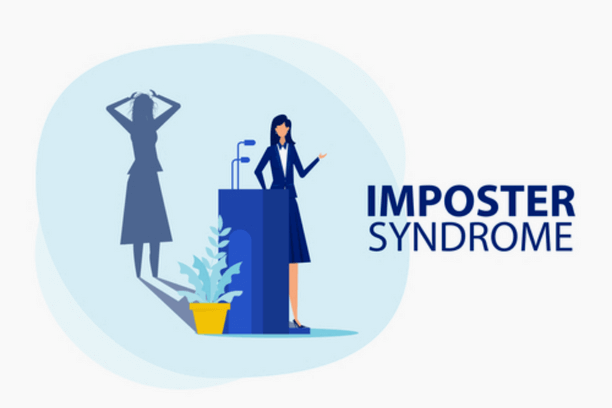What Is Imposter Syndrome?

Have you ever feared that you would slip up or look stupid during a presentation? Impostor syndrome might be why you consistently feel this way and cannot appreciate your successes.
Around 70% of people have felt like an impostor at some time during their professional lives or even as young students. Employees experience the imposter syndrome more frequently now that working from home is particularly widespread, partly because they miss the boss’s input or the transparency needed to justify their productivity.
Individuals who suffer from impostor syndrome are constantly frustrated and anxious because they worry that they always lack the skill or knowledge to be good, that their incompetence will be revealed, and that everybody else is more skilled than them. They consequently self-sabotage, overwork, and stay depressed.
Introduction to Imposter Syndrome?
Imposter syndrome, commonly called the “imposter phenomenon,” is a psychological disorder where a person feels unworthy. Even though there is proof to the contrary, they are anxious, question themselves, and doubt their innate talents. They believe they aren’t as gifted, wise, strong, or competent as those around them.
The condition can show on the job or in an individual’s private life, such as when they believe they aren’t a reliable partner or parent. Imposter syndrome is a pretty typical phenomenon at work, yet it’s possible that many companies aren’t knowledgeable about it. If unaddressed, it can destroy a worker’s morale, leave them feeling out of place, and prevent them from giving their best effort.
Individuals with imposter syndrome get nervous, believe they are not functioning satisfactorily, and will soon be exposed. In other terms, they think they are phony and don’t deserve their positions or successes. This is distinct from a typical struggling employee since a person who has imposter syndrome is prone to be an overachiever or an underperformer.
Even though impostor syndrome is not a proven medical condition, it is a reasonably widespread phenomenon that, if administrators cannot recognize its early symptoms and signs, can have a detrimental effect on a company.
Brief History of Imposter Syndrome
The disorder known as imposter syndrome is not uncommon. In actuality, it has been around for a while. Psychologists Pauline Clance and Suzanne Imes initially recognized it in 1978 in their paper The Imposter Phenomenon in High Achieving Women.
One hundred fifty renowned professional women were examined by the scientists during the investigation. While it was confirmed that these ladies had experienced considerable success in their careers, they discovered that many felt unworthy of it and thought they were fake.
Scientists and psychologists hypothesized that imposter syndrome particularly impacted women after conducting several investigations. Yet, studies conducted since the 1970s have shown that this phenomenon can affect individuals of all sexes, ages, ethnicities, educational backgrounds, and jobs. Also, the syndrome is now linked to a sense of worthlessness, particularly at the professional level, in addition to the thought that one is an imposter.
Typical Signs of Imposter Syndrome
If imposter syndrome is not addressed in the workplace, it can negatively affect a company’s growth. But identifying it is incredibly challenging. Because of this, supervisors or managers must be aware of the warning signs of imposter syndrome so they can recognize when an individual may be experiencing it and provide counseling and assistance to help them overcome it.
Here are some major signs that you must look out for –
- Low self-esteem
- Self-isolation
- Doubting too much
- Trying to do anything too perfectly
- Overworking
- Working overtime too often
- Getting burned out from working
- Getting stressed out while performing easy tasks
- Nitpicking other employees
- Getting too stressed out while meeting deadlines
- Self-judgment
- Procrastinating
- Taking complements as sarcasm
- Struggling to ask for help
- Fearing new opportunities
- Suddenly decline in productivity
Categories of Imposter Syndrome
-
The Superhuman
Those who encounter this condition push themselves further to keep up in the workplace because they think they’re imposters among their peers. Nevertheless, this is merely a makeshift mask for their anxieties, and the overload could be bad for their interpersonal connections and psychological health.
Individuals with this condition depend on the approval they receive from their professions, not the work itself. Try not to focus on others’ approval. Even when the employer praises your work and effort, nobody is supposed to be able to make you feel better about yourself than you. However, have the ability to accept honest feedback seriously while remaining neutral.
-
The Soloist
Experts refer to Soloists as those who fear seeking assistance exposes their phoniness. Being individualistic is acceptable, but not to the point where you reject help in order to establish your value. A key trait is understanding when and how to ask for assistance, not just at the workplace but in general.
Asking for assistance is never a sign of vulnerability; however, being self-aware enough to recognize when assistance is needed may be one of our best attributes. After all, asking for help is much more productive than trying to finish an assignment independently.
-
The Expert
If you believe yourself to be a “specialist,” you certainly want to learn as much as possible before beginning a new assignment. You like approaching new endeavors with expertise and knowledge, and you presumably often look for opportunities to expand your technical skills or acquire advanced education.
However, your desire to establish yourself as an “expert” might result in impostor syndrome, which prevents you from searching for employment if you don’t satisfy all the requirements or from speaking publicly at a conference because you’re scared that your answers won’t be entirely accurate.
-
The Natural Genius
According to, those with this imposter syndrome think they must be a “natural genius.” As a result, rather than focusing on their work, they focus on their skills. In other words, they feel ashamed if it takes them a while to perfect everything. Similar to perfectionists, these impostors have an extremely high standard.
But, those who think they are naturally genius rate themselves not only according to their absurd standards but also according to how well they complete tasks the first time. They get anxiety attacks when they’re unable to act fast or effectively.
-
The Perfectionist
Imposter syndrome is thought to be linked with perfectionism, according to many psychologists. Consider this: Perfectionists have unrealistically high standards for themselves, so when they fall short of an objective, they are deeply troubled by the sense of failure. Regardless of whether they understand it or not, this subgroup can also be egomaniacs who believe that to get something done properly, they must do it personally.
Ways to Deal With Imposter Syndrome
It’s difficult to stop this behavior, but specialists have some ideas on how you can deal with it. Use these strategies if you’re suffering from imposter syndrome to mitigate its impact on your mood and your productivity.
-
Stop perfecting everything
In order to get past these issues, it’s crucial to learn how to perform tasks well enough rather than flawlessly—recognizing your efforts by providing prizes for achievement and learning to appreciate those achievements.
As you attempt to redefine how you view your accomplishments, it’s wise to start slowly. You may gradually alter your mindset over time by taking small measures. For example, instead of waiting until your work or project becomes perfect, allow your co-workers to examine your project when it is not done yet.
-
Preserve your achievements
A visual reminder of your accomplishments can be helpful when you feel worthless. Save the message your boss emails you thanking you for your excellent performance on an assignment. If your kid writes you a note complimenting you on being a good parent, put it somewhere you can see. These reminders will help you feel better, particularly on those depressed days when nothing is going your way.
-
Don’t compare yourself to others
You will always find something wrong with yourself when you judge yourself with others in a social environment, which feeds the sense that you’re not talented enough or don’t deserve anything. Instead, please pay attention to what others say when speaking to them. Have a serious passion for discovering more.
-
Speak with a therapist
A therapist can assist you in identifying imposter syndrome-related symptoms and developing new coping mechanisms. Taking necessary actions is a great way to deal with these problems. It’s essential to make sure you react and push on instead of getting dragged down by the notion that “I can’t do this.” Self-doubt might make you lazy. But now that you know how to handle these emotions, you can take steps to avoid falling victim to the impostor loop.
-
Do not spend too much time on social media
We know excessive social media consumption has been linked to inferiority complexes. It will only exacerbate your emotions of being an imposter if you attempt to project an online portrayal of yourself that doesn’t reflect your true personality.
-
Share your thoughts with others
Although it could seem that you are the sole person facing imposter syndrome, that is not the case. Inform a friend or colleague you can trust about your experience with imposter syndrome. You might be shocked to learn that they occasionally experience the same emotions. They can also help you see how competent and successful you are.






